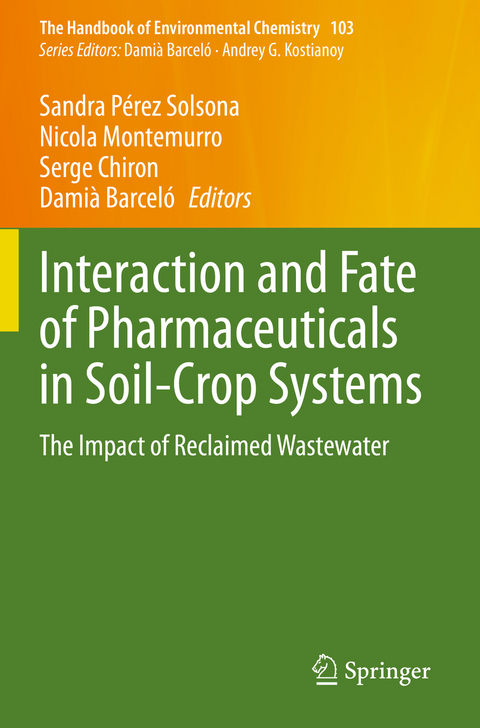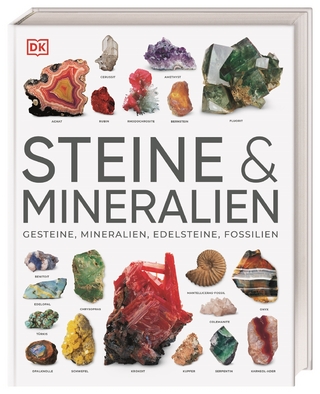
Interaction and Fate of Pharmaceuticals in Soil-Crop Systems
Springer International Publishing (Verlag)
978-3-030-61292-4 (ISBN)
This book provides a comprehensive overview of the current knowledge on the fate and interaction of pharmaceuticals in soil-crop systems. It addresses the principles of their transport, uptake and metabolism and reviews methodologies for their analytical determination. It also discusses ecotoxicological effects arising from their presence and highlights bioremediation approaches for their removal.
The use of treated wastewater to irrigate crops is becoming more widespread in regions where freshwater is limited. This practice conserves freshwater resources and contributes to nutrient recycling. However, concerns remain regarding the safety of irrigation with treated wastewater since it contains residues of pharmaceuticals that have survived treatment, which means that soil and fauna are potentially exposed to these xenobiotics. Various pathways govern the fate of pharmaceuticals in crop-soil systems, including soil degradation; formation of non-extractable residues; uptake by soil-dwelling organisms (e.g. earthworms); and uptake, transport, and metabolism in agricultural crops. Investigations into these aspects have only recently been initiated, and there is still a long way to go before a meaningful assessment of the impact of wastewater has been completed.lt;p> Dr. Sandra Pérez Solsona , scientific researcher at the Department of Environmental (h-index=41). She has a Ph.D. in Chemistry from the University of Barcelona (2003). Postdoctoral researcher at the State University of New York at Buffalo (2003-2005). Her work is focused on the study of occurrence, distribution and degradation of pollutants in the aquatic and terrestrial environment. Advanced mass spectrometry techniques such as the hybrid techniques UPLC-Q ToF-MS and UPLC-QExactive-MS for the structural elucidation of novel transformation products and metabolites of organic pollutants and (LC-QqQ-MS and LC-QLIT-MS) for the sensitive trace determination of parent compounds and their TPs in the water cycle are employed. Recently, she has expanded her research interest into the field of fate and degradation of polymers in the environment. She has been involved in more than 20 projects (EU, national and US projects). She was principal investigator of CSI-Environment project and National projects as well as coordinator of PRIMA project 2018 (INWAT). Associate editor from TREAC since 2017.
Dr. Nicola Montemurro is a biologist and expert in wastewater treatment for its reuse in agriculture. He holds a PhD degree in Biodiversity, Agriculture and Environment in 2017. His PhD research studied the effects of the use of reclaimed municipal wastewater for crop irrigation. He is currently working as a postdoctoral research fellow at the Institute of Environmental Assessment and Water Research (Barcelona, Spain) to assess the fate of emerging organic contaminants in agricultural crops and their potential risks for the environment and human health. His research focuses on the presence of new emerging contaminants and their metabolites/Transformation products in different matrices (water, soil, crops, and earthworms). The assessment of the presence and fate of emerging environmental contaminants is based on field studies and laboratory scale experiments in controlled greenhouses. He is constantly involved in development of new analytical methods based on liquid chromatography coupled to mass spectrometry of low and high resolution such as Q-Exactive Orbitrap and Hybrid Q-ToF systems.
Dr. Serge Chiron, born in Avignon in 1965, he obtained a B.Sc. in Agrochemistry from the University of Grenoble and a Ph.D. in Analytical Chemistry from the University of Barcelona in 1995. He is currently working as a research director at the French National Research Institute for Sustainable Development (IRD) in Montpellier. He was also appointed as a permanent lecturer at the University of Marseille from 2001 to 2011. His research career has been focused in the area of environmental chemistry with a particular interest in the degradation processes of emerging contaminants in water and soil including photochemical and biodegradation processes as well as their remediation at source using advanced oxidation processes (AOPs) and nature-based solutions (NBS). According to Scopus, he has an H-index of 36 and a total number of citations over 5 000. He has been involved in a research chair with Veolia - risk analysis related to emerging contaminants in water bodies - and in several national and European research projects dealing with the fate of emerging contaminants in river basins or in agroecosystems through wastewater reuse. He is currently also involved in the development of innovative decentralized water treatment systems, which has led to several patents.
The Journey of Human Drugs from Their Design at the Bench to Their Fate in Crops.- Sources of Pharmaceuticals in water.- Environmental, economic, and ethical assessment of the treated wastewater and sewage sludge valorization in agriculture.- Wastewater Reuse in Agriculture: Effects on Soil-Plant System Properties.- Uptake and Translocation of Pharmaceuticals in Plants: Principles and Data Analyses.- Soil Sorption and Degradation Studies of Pharmaceutical Compounds Present in Recycled Wastewaters Based on Enantiomeric Fractionation.- Uptake and effects of pharmaceuticals in the Soil-Plant-Earthworm System.- Metabolism of Pharmaceuticals in Plants and their Associated Microbiota.- Impact of PhACs on soil microorganisms.- Biomarkers in earthworms.- Vermiremediation of Pharmaceutical-Contaminated Soils and Organic Amendments.- Constructed wetlands and phytoremediation as a tool for pharmaceutical removal.- Development of methods for the determination of PhACs in soil/earthworm/crop system irrigated with reclaimed water.- Analytical approaches for the determination and identification of drug metabolites in plants after uptake.- Conclusions and Future Perspectives.
| Erscheinungsdatum | 30.01.2022 |
|---|---|
| Reihe/Serie | The Handbook of Environmental Chemistry |
| Zusatzinfo | X, 530 p. 1 illus. |
| Verlagsort | Cham |
| Sprache | englisch |
| Maße | 155 x 235 mm |
| Gewicht | 819 g |
| Themenwelt | Sachbuch/Ratgeber ► Natur / Technik ► Natur / Ökologie |
| Naturwissenschaften ► Biologie ► Ökologie / Naturschutz | |
| Naturwissenschaften ► Chemie ► Technische Chemie | |
| Schlagworte | antibiotic resistance • Crop uptake • Earthworms • Metabolism • PhACs • Phytoremediation • Soil Degradation • Toxicity • Wastewater Irrigation • Water Quality and Water Pollution |
| ISBN-10 | 3-030-61292-9 / 3030612929 |
| ISBN-13 | 978-3-030-61292-4 / 9783030612924 |
| Zustand | Neuware |
| Haben Sie eine Frage zum Produkt? |
aus dem Bereich


